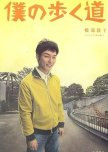A good five to ten percent of the dramas I watch seem to involve a disability of some kind. Prior to watching Boku no Aruku Michi I completed Heaven's Coins, a two-season series about a deaf girl who falls in love with the doctor she works for (that's a VERY brief description). While the lead character was strong, much of the series was based on both the expected pity of the viewer and the pity of the characters that surrounded her. This is true of each drama that was centered around a character with a disability. Naturally, a new series that focused on a disability would need to be different somehow.
Boku no Aruku Michi achieves this by creating a character to cheer for, a lead that would overcome obstacles inherent in his disability. This series is about a 31 year old autistic man named Teruaki (played by Kusanagi Tsuyoshi) becoming more independent than he (and the characters that surround him) would have ever deemed necessary or possible.
I found it amazing that the reason I was tearing up was not because I felt sorry for Teruaki, but because of the positive occurances that he was the cause of. As Teruaki expanded the understanding of the world, he would inadvertently provide unsaid advice to those close to him. Thus, the focus wasn't the autistic man relying on others, but others relying on him. This is a refreshing take on "disability dramas" and a welcome change from their usual reliance on pity.
Admittedly, Kusanagi-san is on my vote list for favorite actors and while I may be fairly biased, this drama only helped boost my admiration of his acting ability. One may say that all he did was look blank and depended on his supporting cast for emotion, but I feel that his role was much more complex in that he had to accurately portray an autistic person while evoking emotions on camera that he had little control over.
To emphasize his extremely subtle emotions the show depended greatly on the musical score. The score's tone drifted intricately between melancholy and pride, leaving it up to the viewer to interpret the scene within those guidelines. In doing so, the music helped give the theme of independence a greater voice, further drawing the audience into Teruaki's world. As a very odd aside, some of the music reminded me of the computer game Monkey Island. Take that as you will.
The supporting cast was decent to very good. Of particular interest was the role of Ootake Satoe, Teruaki's mother, which was acted exceptionally well by Nagayama Aiko. Many of the tears I shed came from her pride in her son. Karina seemed a bit dry as Teruaki's childhood friend Miyako, but as the series went on it made more sense. She is very beautiful and to her credit she seemed to portray maturity well for an actress who is 23 (her character is 26). As her character grew, I became more comfortable in her acting ability.
The writing is decent. Each story line, while executed fairly well by each cast member, was very slow paced and thus the entire series can seem to drag on. It is not until later when you realize the growth in each character that the viewer may become more involved to the point where the pacing does not matter. In this respect, the series may definitely not be for everyone. As somebody who just finished Heaven's Coins, this slow, positive story is a welcome change to the hair-pulling frustration of the former series.
This show was very positive, poignant, and while admittedly very slow, it never drifted out of the bounds of possibility. It seemed real, and the emotions it evoked were just as well. It was enjoyable, lighthearted, and inspiring -- a great feel-good drama that offered a bit of tears on the side.
(Originally posted January 20th, 2007.)
Esta resenha foi útil para você?






Comentários